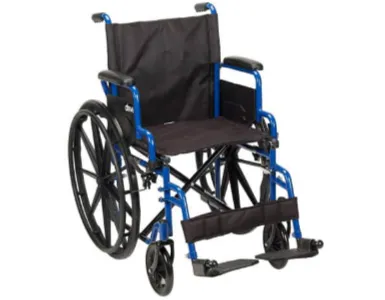If you’re starting to shop for an upright walker, one of the key questions on your mind is likely how much does an upright walker weigh?
After all, you’re going to need to make sure you can carry it with you.
Generally speaking, an upright walker’s weight is between 15 lbs and 25 lbs, depending on the model. Rollators are lighter and range between 13 lbs and 18 lbs.
A rollator tends to be less robust and slimmer than an upright walker, but the walker provides more support for those who need assistance walking.
Table of Contents
Key Takeaways:
- Upright walkers are designed to provide support and stability to individuals with weak or impaired balance. [1]
- They typically weigh between 10-20 pounds, depending on the user’s weight capacity.
- In addition to providing support and mobility, upright walkers also feature a basket or pouch to carry items.
- Most models come in adjustable heights so they can comfortably fit users of different sizes.
CHECK: Vive Health Mobility Upright Walker With Seat
How Much Do Upright Walkers Usually Weigh?
The average weight for an upright walker is 18 lbs. However, SOME models are heavier or lighter depending on the construction materials and accessories included.
Lightweight aluminum walkers USUALLY weigh between 15 and 22 lbs, while heavy-duty steel frames may weigh as much as 25 lbs.
It is important to pick a walker that is the CORRECT weight for you.
A walker that is too light may not be able to handle your body weight and provide support, and too heavy of a walker may be DIFFICULT to carry or maneuver.
Watch the following video to learn why the proper upright walker weight is so important:
RELATED: How Much Does a Typical Walker Weigh?
How Do You Know a Walker is Lightweight?
When you’re buying a walker, you’ll find that there is NO set standard for lightweight and heavy-duty upright walkers.
This can be a problem for those who need the classifications.
However, there are SOME criteria you can keep an eye out for that will clearly indicate the weight you can expect from your chosen model.
Material for the Frame
A lightweight walker is usually made from aluminum or other lightweight materials, while heavy-duty models are TYPICALLY constructed from steel.
Additionally, the height should always be adjustable.
What does a tall walker weigh? The height doesn’t make a difference to this at all, and being able to alter the height is EXCELLENT for improved posture.
In this video, I’ll be sharing my tips and tricks on how to use a walker to go up and down stairs safely and comfortably:
Size of the Frame
The size of the frame is also an INDICATOR of weight.
Smaller frames tend to be lighter than larger ones, so if you are specifically looking for a lightweight model, try to find one with a smaller frame.
A tall walker (height adjustable) can also help you to maintain an UPRIGHT posture.
It can be used for indoor and outdoor use, and while traditional walkers are a little bulky, they can still be portable.
Pro Tip: An adjustable height means a safer upright posture walker as there is less strain on your back, and your upright position puts you at less risk of falling.
Size of the Wheels
The size of the wheels on a walker is also RELATED to weight.
Smaller wheels tend to be lighter, so if you’re looking for an especially lightweight model, look for one with smaller-diameter wheels.
Pro Tip: When making your choice, it should be a model where the upright walk wheels lock. This allows you to take a break when needed.
Accessories and Features
Look for walkers with FEW or no extra features or accessories, as these will add to the device’s overall weight.
Additionally, a rollator walker can be an option to consider for those trying to AVOID anything too heavy.
Small walker wheels, a sturdy foldable frame, and MINIMAL accessories can do a world of good for your weight limit. For example, do you really NEED that beverage holder?
While a walker seat can be tempting, you should only pick this if you really need it, as it can add weight to the model.
A lightly padded seat will add LESS weight, but you should test it out first.
Pro Tip: An upright walker storage bag is a lightweight accessory that can be exceptionally useful, so you will want to consider this.
Component Materials
In addition to the frame material, look for what the components are MADE FROM. Things like the brakes and the handlebars will affect how much a walker weighs.
The hand brakes should be DURABLE, preferably made from aluminum or other lightweight materials.
The handlebars should also be adjustable and feature a slip-resistant grip for safety.
Conventional walkers will ENSURE the hand brake loops outward, making it easy for you to access while also providing minimal impact on weight.
Pro Tip: Having your armrests adjust forward can be a tempting feature, but the component materials can be a little heavy, and the finish is bulky.
ALSO CHECK: How to Stand Up Using a Walker
Why Do Upright Walkers Weigh More Than Rollators?
Upright walkers usually weigh MORE than rollators because they are more robust and have larger frames.
Upright walkers also tend to feature additional features, such as seats and baskets, which ADDS to their overall weight.
On the other hand, rollators are LIGHTWEIGHT and slim and often come with fewer features. This makes them very portable and easy to carry around.
However, it is important to remember that the WEIGHT of any walker will vary from model to model, so it’s always best to CHECK the specifications of your chosen model.
Frequently Asked Questions
How Much Does a Walker with a Seat Weigh?
The weight of a walker with a seat can vary depending on the model, but typically they range between 15 and 25 lbs.
Does an Upright Walker Help Posture?
Yes, an upright walker can help improve posture. The upright design of the device encourages better posture and helps to support your back and legs.
Do Doctors Recommend Walkers?
Yes, doctors often recommend walkers for seniors or those with mobility issues. Walkers can help to improve balance and stability, as well as reduce the risk of falls.
Can You Get a Walker with a Prescription?
Yes, in some cases, a doctor may be able to provide you with a prescription for a walker.
This is typically done when the patient has mobility issues, and insurance will cover the cost of the device.
Conclusion
When shopping for an upright walker, it is IMPORTANT to consider how much the device weighs.
Generally, they range from 15-25 lbs, and you should pick one that will provide the support you NEED without being too heavy.
Additionally, look for features such as the size of the frame, wheel size, and the material of its components and accessories when determining weight.
With the RIGHT information, you can easily find a walker that is light enough to carry while still providing the SUPPORT and stability you need.

Sources:
1. Sehgal M, Jacobs J, Biggs WS. Mobility Assistive Device Use in Older Adults. American Family Physician [Internet]. 2021;103:737–44. Available from: https://www.aafp.org/pubs/afp/issues/2021/0615/p737.html






i bought my walker and paid over$100.00 i need a new one now and the doctor gave me a prescription The only one Drug Mart said i could get was the one that weighed 23 lbs. The prescription said light weight on it. I cannot lift that one so I haven’t gotten one yet. The 23 lb I would pay only 20% which I didn’t mind but its too heavy